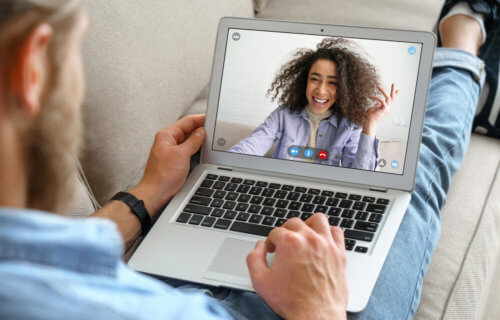NEW YORK — The coronavirus pandemic continues to complicate seemingly every aspect of our lives, and a new survey finds the realm of dating is no different. Dating can be a tricky endeavor at any given time, but all of the restrictions brought on by COVID-19 have made connecting with new people infinitely harder in 2020. More than six in 10 Americans (63%) believe dating will never be the same in the wake of the pandemic.
Of the 2,000 U.S. adults in the poll, 31 percent say virtual dates are now the new normal. They add that this isn’t going to change anytime soon.
So, what type of changes are we talking about exactly? Well, 30 percent think more and more people will use dating apps to meet new people. Another 30 percent say goodnight kisses will now have to wait until the second or third date. Similarly, 44 percent predict everyone will be much more cautious about any kissing and touching moving forward.
Overall, 66 percent say the pandemic is the single biggest game changer for the world of dating since the creation of online dating platforms.
Is it easier to get comfortable with someone in 2020?
Commissioned by WooPlus, the research actually notes some dating and relationship positives brought on by 2020 as well. Nearly six in 10 (57%) believe that quarantine has helped them reach a “comfort zone” with their romantic partner. What exactly is a comfort zone when it comes to dating? On average, respondents say it takes five months to really feel comfortable with a partner.
When asked about specific comfort zone signs, 48 percent say sleeping in the same bed is the top giveaway that you’ve reached comfort zone status in your relationship. Other signs listed by participants include meeting their partner’s family (38%), leaving the door open while using the bathroom (37%), telling each other deep secrets (36%), and showering at each other’s places (36%).
Another 34 percent say using pet names for one another is a big sign of reaching the comfort zone. Some say you must be comfortable walking around the house naked with your partner (28%), or be able to sit in silence without it being awkward (27%).
Four in five participants say once they’ve reached their comfort zone they can really be themselves around a partner. Surprisingly, many Americans believe meeting in person isn’t even necessary to achieve this. About half of those polled say they can reach their comfort zone with someone via virtual dates alone.
Virtual dating solves lots of problems
Respondents were also asked about the positives associated with virtual dating. The top answer to that question was “easier logistics,” meaning there’s just less to worry about in general. Those issues include who pays the bill or will there be a goodnight kiss tonight. Thirty-eight percent find it easier to really get to know someone from behind the safety of a computer screen.
Others add it’s cheaper to date online (32%), virtual dating makes it easier to “take things slow” (32%), and it’s easier to connect with a date when it’s virtual (28%).
“Though the pandemic is upsetting the natural rhythms of dating and changing how you communicate with a new partner, that doesn’t mean we are locked out of love,” says WooPlus CEO Neil Raman in a statement. “The pandemic has opened the door for people to get creative with virtual dates, focus on forming an emotional connection and establish a ‘new normal’ for their dating lifestyle.
Two in three Americans agree what matters most is who you’re dating, not how that person comes into your life.
The survey was conducted by OnePoll.
